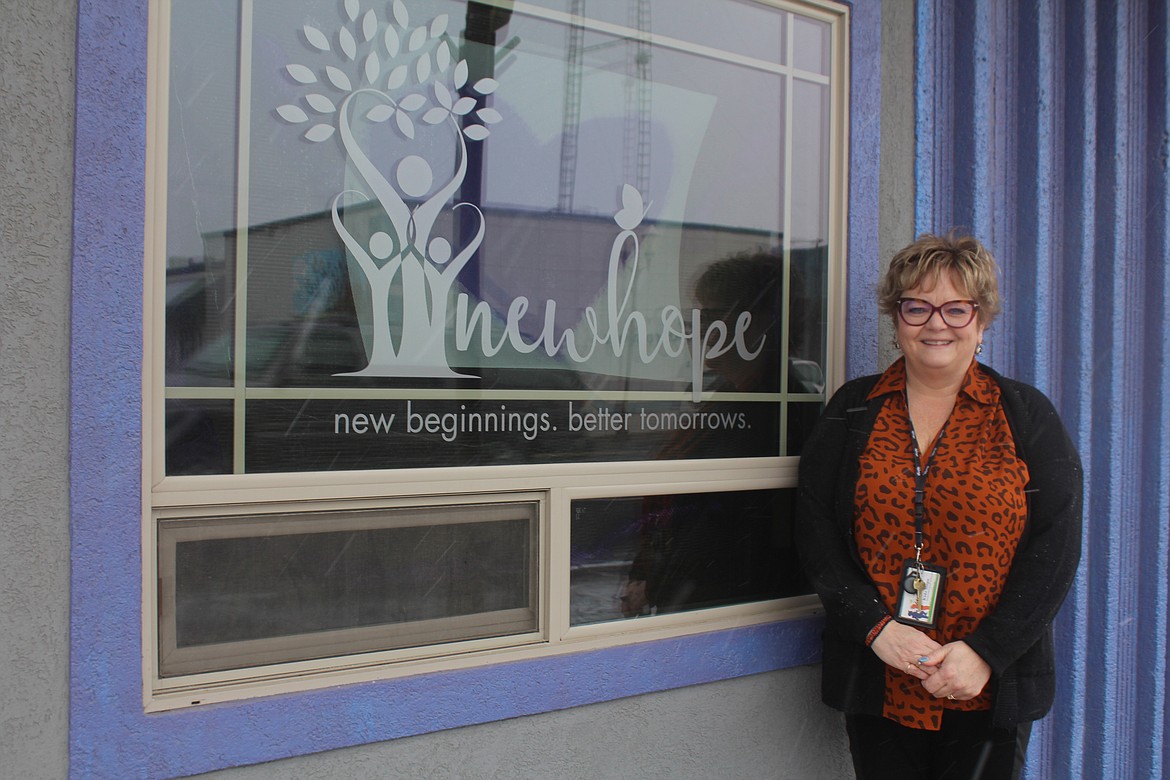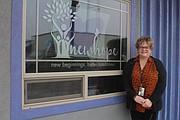New Hope
MOSES LAKE — Domestic violence and sexual assault leave a lot of damage and chaos behind them – that’s true of all crimes, in fact. The job of the advocates at New Hope is to help people who’ve survived domestic violence, sexual assault and other crimes work through the chaos and deal with the damage.
“We’re really proud of the fact our hotline is staffed by our advocates,” said New Hope Director Suzi Fode. “It’s not an answering service, it’s not a volunteer (service). It’s someone who’s trained as an advocate. It’s the same person you’d see if you walked through the door. We have 12 advocates here and they rotate that 24-hour shift.”
New Hope’s main office is at 311 W. Third Ave. in Moses Lake; Fode said there are offices in Quincy, Othello, Ephrata, Mattawa and Royal City as well.
“Grand Coulee and Ritzville, we have a place to go. A safe office to meet,” Fode said. Agency advocates will meet with people in those locations by appointment.
There is a shelter with four bedrooms in Moses Lake, she said, open first to domestic violence survivors.
“We prioritize domestic violence clients,” Fode said. “And that has to be someone who’s fleeing immediate danger because we’re full all the time.”
The agency provides support and assistance for victims of any crime. About 60% of the advocates speak Spanish, Fode said, and one speaks Mixtec.
The number of people who sought help at New Hope increased in the three years between 2019 and 2021, according to statistics provided by the agency.
Victim numbers have increased each of the last three years for all of the client types that New Hope serves (see sidebar).
Fode said she thinks the increases may be a sign people are more willing to report incidents when they happen.
“I think the statistics are probably pretty static,” she said. “I think it’s a testament of our reputation – people reach out. We’ve amped up our outreach. People know who we are.”
New Hope and its sister agency Kids Hope have built a network with other agencies, said Elisa Adolphsen, child advocacy coordinator for Kids Hope
“We have good relationships with partners like law enforcement, (Child Protective Services), who are out there,” Adolphsen said. “Law enforcement is responding to those calls, and they’re saying, ‘Here’s a resource, reach out.’ Or sometimes they’re bringing them here. I feel like those partnerships have played a role.”
The chaotic situations are fluid by their nature, and Fode said the advocates have different ways to help people wherever they find themselves.
“It really depends on how someone may reach out. If they call our hotline and they’re fleeing, we’ll agree to meet them in a safe place and find them a safe place to be, with very minimal intake. If it’s the middle of the night and a crisis is happening,” Fode said.
“If someone walks in the door, and if it's much more of a planned thing by the survivor, we sit down, we do a pretty thorough intake with them,” Fode said. “And then we talk through options that really the client leads us to. Our advocates have a huge tool belt of ways to elicit information from folks. And then they offer out all the options that maybe they haven’t thought about, or that they’ve said but just haven’t articulated well. And then it’s up to the survivor to make that choice. And our advocate helps them follow through on that choice.
“Maybe that choice is, ‘I’m going home today. I’m going back home, I’m going to make a plan, I’m going to pack my bag, I’m going to set things in motion,’” Fode said.
“So not always is it leaving your abuser. It’s being safe about it,” Fode said.
“Or maybe they go now. They get an order for protection. We can help them with a civil order for protection, and get (to) safety,” she said.
“Maybe they’ve been sexually assaulted and they need to get to the hospital. And we meet them at the hospital. So really, it’s driven by the client – if the client comes in (and explains the situation), our advocates just know how to switch it into a gear that keeps (the client) right where they’re at,” she said.
The support provided by New Hope doesn’t stop with the initial contact.
“A survivor might have issues with substance abuse, (and) we might need to help them get into a treatment program. We might need to help someone get a job. We might need to help someone figure out transportation from the boonies to get their kids to school and to get to work. So our advocate is going to work through those options, too. It’s community-based, so whatever the client might need – if it’s housing, if it’s legal, (although) legal resources are pretty slim.”
The legal resources are an example of the agency’s funding that Fode said is often misunderstood.
“There is some free legal aid out there, but it’s so limited,” Fode said.
“Even though we are a Grant County agency, we are funded entirely by grants,” Adolphsen said. “Which makes a difference.”
New Hope and Kids Hope use donations to cover the gaps; donations cover about 60% of the therapist position at Kids Hope. Donations also pay for about 50% of the community prevention efforts.
Fode said the agency is accepting donations, both monetary and help with services like pro bono legal assistance.
Cheryl Schweizer may be reached at cschweizer@columbiabasinherald.com.
Getting help
Call the always-open helpline for New Hope at 888-560-6027.
How to help
Donations are used to cover gaps in current needs not met by funding sources. Here’s where the money goes:
• 60% of therapist position
• 50% of prevention work
• Supplement extra costs of additional support group
• Monetary donations for specific items and services:
• Travel expenses for domestic violence survivors that need to relocate
• Diapers and car seats
• Food, gas and clothing costs
• Donations to provide legal services for survivors
• Adopt-A-Family for Christmas
• Cell phones, camera doorbells, door locks, vehicle repairs and maintenance
• Therapeutic resilience tools and grounding kits for children
• Helping survivors recover from trauma, such as painting a room where abuse happened





